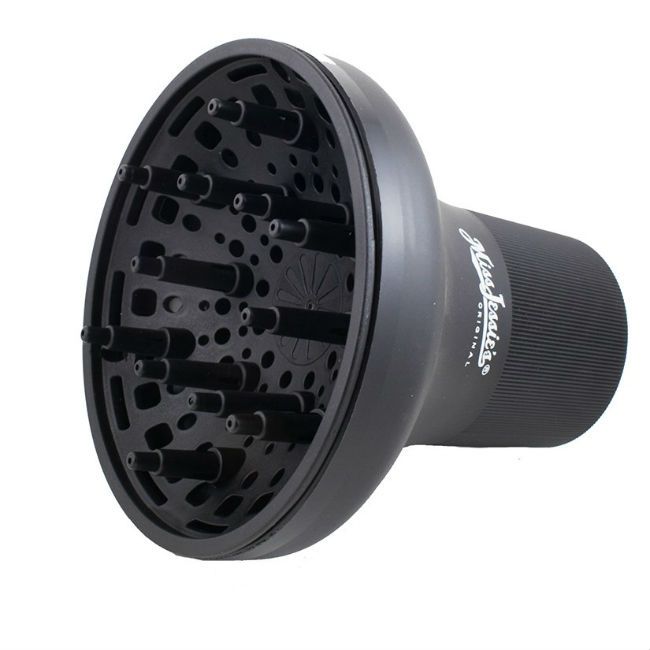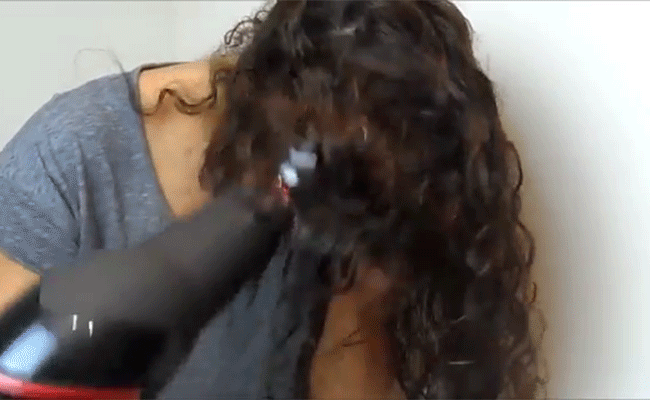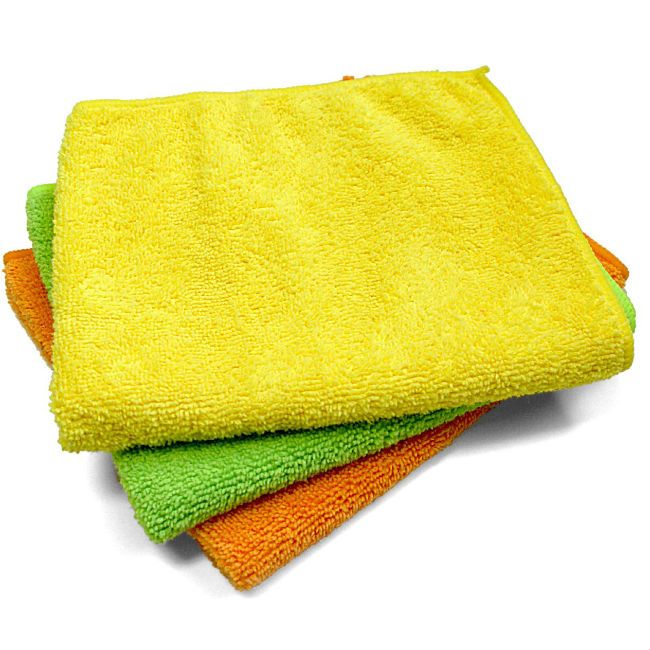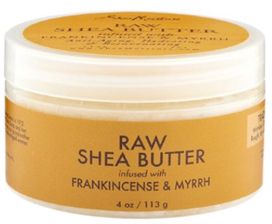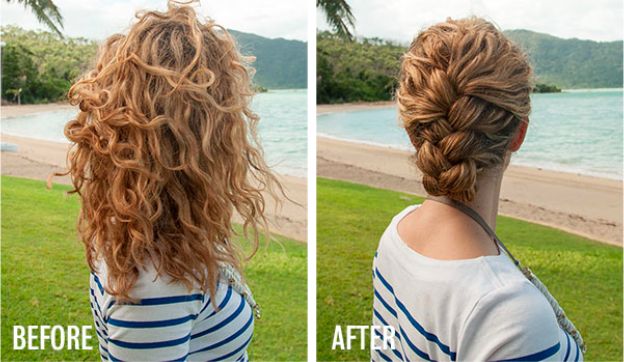Search Results: ToellaP

Wavy hair is delicate and should be treated as such, especially while being dried.
Sometimes instructions on products need to be revised for wavy hair. As a general rule of thumb avoid heat and fabrics that draw out too much moisture. Here are the 2 ways girls with wavy or curly hair can dry their tresses, and tips on minimizing heat damage and getting the best results.
Method 1: Diffusing
Find a hair dryer and attach a diffusion nozzle to the end. This will spread out the heat so it doesn’t damage the hair. Use the diffusion nozzle to dry your hair. If you are using the DevaCurl Devafuser, aim the air at your roots by allowing the hand-like structure of the diffuser to reach right into your hair. Next, aim the air at the canopy. Finish by drying the roots.
Method 2: Plopping
Ditch the terrycloth towels when drying your hair because it snags and snaps hair and it also absorbs too much moisture. Instead, swap it for microfiberwhich will be more gently to your hair. Flip your head upside down and with the towel, gently scrunch your hair up towards your scalp. Do this until your hair is about 70 percent dry. Then stand up straight and gently part your hair as you would like, being careful not to separate your waves and create frizz. Allow your hair to air dry.
Want better wave definition?
1. Blot your wet hair with microfiber towel until it is not dripping but is still damp.
2. Flip your head upside down, scrunching a curl-defining gel or cream product with the palms of your hands into your waves.
3. Flip your head back right-side-up.
4. Blow dry hair with a hair drier with a nozzle attachment.
5. Continue drying hair until it is about 90 percent dry and allow it to hair dry the rest of the way.
How to prevent frizz and make your waves clump
- Blast your hair with cool air to seal the cuticle and reduce friction that might result in frizz.
-
Apply a light coat of oil to the tips of your hair while it is drying–especially when wearing fabrics like wool–to avoid friction that might cause split ends and fairy knots.
-
Paper towels or t-shirts will work just as well as a microfiber towel.
- Close the windows in your car and turn the heat or AC up on high! Your hair will dry quickly.
Ayurvedic herbs have long been used in India as a part of a woman’s regimen to ensure strong, healthy hair. Each herb has special properties unique to it and they are all used for different things. They can be used as hair dyes, anti-inflammatory treatments, and growth treatments. They most frequently come in powders or oils.
1. Henna
Henna is the most commonly used ayurvedic herb. This powder is great as a conditioner and cleansing treatment. It normally comes in a powder that is mixed with oil, honey, conditioner, and water. Henna makes hair feel softer and retain moisture easier, and is ideal for dark brown hues.
2. Neem
Neem is used in combination with coconut oil in anti-inflammatory treatments for dry and itchy scalps. It is also a cleansing herb for both the scalp and the hair, and sends a healthy dose of protein to hair.3. Brahmi
Brahmi is full of antioxidants and is often used to relieve tension and anxiety, making it a popular treatment for nervous disorders. As a hair treatment, it is often used to alleviate dandruff problems and stimulate follicle growth due to its antioxidants.4. Aloe vera
Here’s an ayurvedic herb you will recognize: aloe vera. It can be used to help stop hair loss while encouraging hair growth. It is also used as a cleanser for the hair and scalp. Aloe vera can also be used in conjunction with other oils as a skin moisturizer.5. Sesame
Sesame seeds can be used to promote follicle growth while making hair feel soft. They can even be used to dye hair.6. Gooseberry
This commonly used herb thickens and promotes hair growth. It prevents scalp itchiness, hair loss, and dandruff. It can also make hair bouncier and shinier. Use gooseberry alone or in combination with henna to dye hair dark brown. It can be used as a scalp calmer, a hair thickener, and an all natural hair dye plus so much more!7. Shikakai
Shikakai is commonly used with other ayurvedic herbs as an alternative to commercial shampoo. Its herbal properties make it less damaging than most chemical sulfate shampoos.8. Coconut Oil
In India coconut oil is a ubiquitous treatment for a whole host of hair and beauty issues. Some say this use for coconut oil even originated in India. Women all over the world are now using coconut oil for their hair and skin, but just in case this oil is new to you check out these 8 ways to use coconut oil.
[prodmod]Dry shampoo is a hair product used without water that removes oil and dandruff. It makes hair look refreshed without the harmful use of harsh shampoos that often damage hair, especially curly hair. While using sulfate free shampoo can help reduce the damage, using less shampoo or dry shampoo will lower the risk of damage even more.
Sometimes, dry shampoo can be hard to find sometimes in some areas. And when it is found, it can be expensive. Here are two recipes for make-it yourself dry shampoo.
Dry shampoo formulas should change depending on your hair color. Because it is a powder that you do not wash out, it will be visible if the color of the powder is too different from the color of your hair.
For lighter hair colors
mix a quarter of a cup of cornstarch with 1 teaspoon of cinnamon and about 4 drops of essential oils of your choosing. Then use a makeup brush to put it in your hair, focusing on the roots. Finally use a hair brush to brush it through your hair thoroughly. If you do not brush your hair, ruffle your hair with your fingers.
For darker hair colors
Combine one eighth of a cup of cornstarch with one eighth of a cup of unsweetened cocoa powder and one eighth of a cup of cinnamon and about four drops of scented essential oils. Do the same as your light haired friends by using a makeup brush to apply the dry shampoo to your hair, focusing on your roots. Brush or ruffle your hair to distribute the formula thoroughly. These hair brushes are specifically designed for curly, coily and wavy hair.
Recipes courtesy of: brit.co
Myrrh is a resin and essential oil which is considered antimicrobacterial, antifungal, anti-inflammatory, and antiviral through its immunity boosting properties, making it an ideal scalp clarifier. It also reduces phlegm and helps end the body fight colds, coughs, measles, and mumps. Myrrh has been known to cleanse the body of harmful toxins and salts, and is often used in aromatherapy.
Hair Benefits of Myrrh
You will need
-
Small elastic hair ties
-
Bobby pins
-
Hairspray
-
Patience (2 minutes”>
Directions
-
Start with detangled hair that will be relatively easily manipulated.
-
Split all hair into three equal sections at your hairline
-
Begin braiding by crossing the right piece over the middle, then the left over the middle
-
As you continue to braid, add hair from each respective side into the braid. Try to do this so this loosely but not too messily. This takes finesse, but it will come with practice and patience.
-
When you have reached the end of the braid, tie it with the small elastic hair tie.
-
Tuck the end of the braid under the base of the braid and secure with bobby pins in an X formation
Two optional steps
If the look ends up too messy for your liking use hairspray and bobby pins to secure the loose hairs either behind your ear or in your braid. Add bows or flowers to the middle or top of the braid.Watch the video
Thanks to the talented Hair Romance for the inspiration!
Cornrows are coming back. Online they’re part of the “ghetto goth” zeitgeist, and growing up we were always given cornrows to keep from messing up our hair during playtime. Forget that–these next few styles are about to break the bad rep this classic hairdo typically gets. Here are 6 cornrow styles that are appropriate for both work and play.
Cornrows 6 Ways
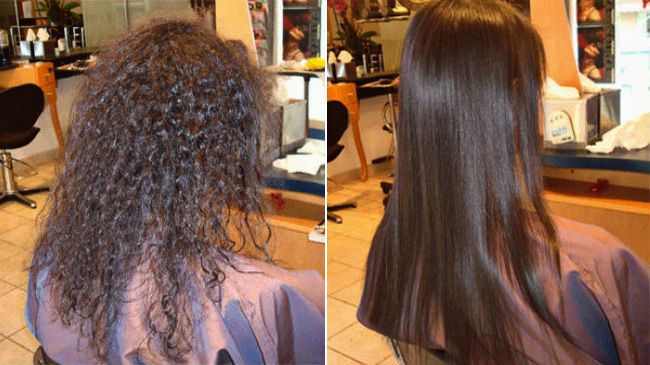 A keratin treatment strengthens the hair by repairing damaged strands, eliminating frizz, and preventing breakage. After receiving the treatment, hair is meant to be easier to manage for straight styles. The usage of keratin in hair products comes with constant back-and-forth within the natural hair community, as it temporarily alters the texture of hair to become straighter. Regardless, many curlies enjoy the strengthening benefits of this protein (which is naturally already in your hair”>.
A keratin treatment strengthens the hair by repairing damaged strands, eliminating frizz, and preventing breakage. After receiving the treatment, hair is meant to be easier to manage for straight styles. The usage of keratin in hair products comes with constant back-and-forth within the natural hair community, as it temporarily alters the texture of hair to become straighter. Regardless, many curlies enjoy the strengthening benefits of this protein (which is naturally already in your hair”>.
A stylist puts the treatment in and flat irons the hair, keeping the new cuticle fibers in their place. The salon process usually takes about 90 minutes. Keratin works best on those with excessive heat and/or chemical damage because it can fill gaps in the hair cuticle with its amino acids.
The pros
- It will eliminate frizz, even in light rainy conditions
- Your hair will be softer and shinier than it was before
- Keratin strengthens the hair shaft
The cons
- Keratin treatment upkeep can be expensive, as it needs to be touched up every couple of months.
- You must wait a few days before cleansing your hair. So if you’re outside in the elements, the build-up in your scalp and odors will be less than pleasant. But you cannot wash.
- The long-term effects of keratin treatments can do more harm than good to your hair cuticle, causing the very damage it was intended to repair.
To sum it up
If your hair is extremely damaged, a keratin treatment might help revitalize it. However, after you do it to your hair multiple times your hair will begin to feel over-processed (much like a chemical relaxer”> and the products might undo all of the good they have done. So if you feel that a keratin treatment will be beneficial to your hair’s health, be sure to get it done at a reputable salon and try to only do it once or twice so it does not begin doing damage to your hair.
Want more?
Read more in depth information regarding keratin treatments in our classic article, Keratin Treatments 101.
Product recommendations
These popular products contain strengthening and frizz-eliminating keratin protein.
- ApHogee 2-Minute Keratin Reconstructor – read reviews
- Briogeo Don’t Despair, Repair! Deep Conditioning Mask – read reviews
- SheaMoisture Smooth & Repair Nourishing Masque – read reviews
- AG Hair Cosmetics Smooth Sleeek Conditioner – read reviews
 Nicknamed “Fruit of the Angels” by Christopher Columbus, this Central American wonder food is known for its low sodium and Vitamin A qualities. Papaya provides a plethora of benefits for both hair and skin. It exfoliates, provides shine, and naturally lightens. Browse through our Recipes Collection for more amazing DIY hair masks.
Nicknamed “Fruit of the Angels” by Christopher Columbus, this Central American wonder food is known for its low sodium and Vitamin A qualities. Papaya provides a plethora of benefits for both hair and skin. It exfoliates, provides shine, and naturally lightens. Browse through our Recipes Collection for more amazing DIY hair masks.
What You’ll Need
- 1 Papaya
- Honey
- Olive oil
- Blender
Directions
- Mix a papaya with honey and olive oil in a blender until the papaya is thoroughly blended into a puree.
- Apply thoroughly to your hair and allow it to penetrate for an hour.
- Rinse out with warm water and lather for a little bit while rinsing out.
If DIY isn’t for you,
- Circle of Friends Maya Papaya Leave-In Conditioner – This adds incredible shine and moisture to dull, dry hair. Read reviews here
- Curl Junkie Curl Assurance Smoothing Conditioner – The champion detangler, known for having tons of slip while eliminating frizz. Read reviews here
- Freeman Papaya and Mango 3-Minute Conditioner – In addition to papaya, this is packed with mango, hydrating hair and repairing breakage. Oh, and it’s 3 bucks! Leave a review here
- Ouidad Superfruit Renewal Clarifying Cream Shampoo – A gentle cleanser that is loaded with acids of other super fruits like acai, blueberry, cranberry, pomegranate, and of course–papaya. Leave a review here
Hand in hair syndrome is a disorder where people with all types of hair can’t keep their hands out of their hair. They pull at their curls, brush their hair too much, touch their hair when its drying, twirl it around their fingers, and other acts of over-manipulation. Here is a guide on how to keep hand in hair syndrome at bay.
Hand in hair syndrome can result in bad symptoms such as weaker hair, split ends, and breakage.
All of these things make it hard to maintain healthy curls and/or retain hair length.
1. Take a good look in the mirror before you leave the house.
Sometimes, you may touch you hair for a few reasons. Maybe you’re nervous about your appearance. You feel like you have pieces of hair that are out of place so you’ll constantly try to fix it. Stop this problem by keeping a compact mirror on you at all times so you can check discreetly, even whenever you’re out in public.
2. Never ever ever brush your hair when it is not sopping wet with conditioner.
Brushing hair while it’s dry causes breakage and split ends. This is because your hair curls and twists around itself and you are ripping the knots out with your brush. When a lot of conditioner is used, the slip that is necessary to safely detangle allows you to detangle the hair without ripping pieces off.
More: 2 Ways to Finger Detangle
3. Style your hair while you are in the shower.
Apply a leave-in while your hair is still soaking wet. That way you are not manipulating your hair when it’s dry so it does not break easily. Do not touch it once you are done styling it or it will frizz up.
4. Avoid mindless tasks.
A lot of the time when I wear my hair down, I find myself playing with my hair absent mindedly while I’m doing things like watching TV or surfing the internet. Whenever I’m doing more engaging things I feel more aware of my actions and I’m more effectively able to stop myself from playing with my hair.
5. Put your hair up.
Pull your hair in a ponytail or bun to stop yourself from pulling and twisting it. When your hair is up, you have to do more to reach it and hopefully this will make you more aware of what you are subconsciously doing so you can consciously put in an effort to stop yourself.
[prodmod]When I was in fifth grade, I had a teacher who took it upon herself to try to shatter my 10-year-old confidence.
It didn’t take long for her to settle on my hair as a target.
My parents decided at an early age to let me learn how to do my own hair and style it correctly. Unlike all of the other African-American girls in my grade, my hair was natural. My teacher would tell me my hair was a distraction to the class when left down but she wouldn’t say that to anyone else in my class when they did the same. She was basically chastising me for having the type of hair that grew from my scalp. I didn’t understand what I did wrong.
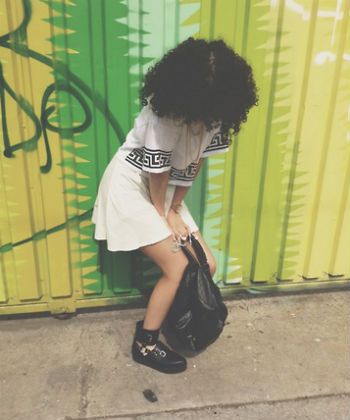 In my experience, curly hair is often frowned upon by our straight-haired peers. Many parents do not know what to do with their little girls’ hair. And because of that, they often either chemically retexturize it or they do things like try to brush it straight. They grow up without any idea of how to do their own hair. Unfortunately, they do not get much help from outside resources.
In my experience, curly hair is often frowned upon by our straight-haired peers. Many parents do not know what to do with their little girls’ hair. And because of that, they often either chemically retexturize it or they do things like try to brush it straight. They grow up without any idea of how to do their own hair. Unfortunately, they do not get much help from outside resources. It took years for me to realize how much my teacher had affected my hair confidence. It also took me years to realize that America has a major phobia of black/textured hair. This problem was much bigger than some fifth-grade teacher in some random school. Natural hair is often seen as unprofessional and unkempt which is obviously ludicrous because people can’t change the way they grow their hair.
It took years for me to realize how much my teacher had affected my hair confidence. It also took me years to realize that America has a major phobia of black/textured hair. This problem was much bigger than some fifth-grade teacher in some random school. Natural hair is often seen as unprofessional and unkempt which is obviously ludicrous because people can’t change the way they grow their hair.What does this say of America’s supposed evolved views on textured hair?
Turn on your television and you’re almost guaranteed to find ensembles of actors with straight hair. Most powerful women with curly hair still choose to hide it. In fact, out of the 20 female senators currently serving–none of them wear their hair curly! When kids don’t see people who look like them in the media and in powerful positions it affects their confidence and makes them feel less able to be in these situations.
Living in a society where straight hair is normal affects children’s confidence and how curly women are seen in general. The fact still remains that straight hair privilege exists and the only way to combat it is for us to have a real open discussion about it.
After co-starring in Moesha with Brandy Norwood, Countess got her own sitcom, The Parkers. She was on top of the world. In what would become a disastrous search for a way to wear versatile hairdos while keeping her natural hair safe, Countess erroneously turned to lace front wigs. She had not realized that every time she took off the wig, she was peeling off a very thin layer of skin. In just five years, she began to have complications. Her hairline started oozing pus; she was having an allergic reaction to the glue used to keep lace front wigs in place. Her hair began to start falling out and she now has discoloration where her hair once was. Skin under her eyes and on her ears even began to peel as a result of the reaction.
Many would prefer to use lace-front wigs instead of regular wigs because they believe that lace fronts create the illusion of the hair growing from the scalp. Celebrities such as Beyonce, Gwen Stefani, Mary J. Blige, Tyra Banks, and even actor John Travolta use lace front wigs. But what many who apply their lace-fronts at home forget is they have very well trained, professional hairstylists. And even then, professional hairstylists can get it wrong too. Just Google search “[insert celebrity] lace front wig showing.”
Countess Vaughn was one such victim but her physical reactions to lace fronts are not uncommon. Due to the harmful but very adhesive glue used when applying a lace front, many women have allergic reactions. Another factor that leads to damaging effects is the tension this places on the hairline. When all that is keeping the wig in place on the scalp is glue, this is a surefire way to cause a loss of hair. Many women have prematurely receding hairlines as a result of lace front-wigs. This of course can lower their self esteem and make the user feel self conscious. It is also counterproductive. The women who use lace front wigs as what they believe is a protective style are the same women who will end up with receding hairlines and possible infections. Unfortunately many only know this once it is too late. Countess Vaughn was very brave to come out in front of such a vain, judgmental society and show people the possible repercussions lace front wigs can bring.
Why are women so willing to go to such extreme lengths to wear long and straight or wavy, synthetic hair?
Women so often feel the need to fit into the box, one constructed by the media, they believe they belong in. Plenty of women would be perfectly fine wearing their hair natural if it were not for their husbands who say they like their hair better straight or the worry that natural hair is seen as unprofessional. Being comfortable in your own hair texture is far more important than any one else’s approval.
If these possible adverse health effects do not deter you, there are things you can do to reduce the damage these wigs may cause.
Avoid the Damage
- Make sure the wig is made of human hair and not synthetic hair because it can often lead to allergic reactions and irritation for some people with particularly sensitive skin.
- To minimize the harmful effects of the glue, refrain from using it too often. Avoid this by keeping the wig on for at minimum one week at a time and do not re-apply the glue until the wig is taken off. It is made of various harsh chemicals that are impossible to avoid when using lace front wigs.
- Keep the wig on for as long as possible and do not take it off until your hair needs to be washed or trimmed.
- Be very patient and do not rip the wig off quickly. Be sure to carefully peel it off trying not to peel off more hair or skin than necessary.
- Alternate between using tape and glue to secure the wig.
- Do NOT not use lace front wigs for long periods of time consecutively (6 months+”>.While these methods will not completely rid you of the damage lace fronts will eventually cause, they can help slow their effects.
PICTURED: WRITER TOELLA

